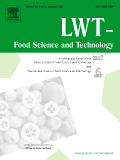
LWT-FOOD SCIENCE AND TECHNOLOGY
metrics 2024
Innovating solutions for contemporary food challenges.
Introduction
LWT - Food Science and Technology is a premier academic journal published by Elsevier, specializing in the multifaceted fields of food science and technology. With a distinguished presence since its inception in 1973, this journal has evolved to become a vital resource for researchers and professionals aiming to advance knowledge in food safety, preservation, processing, and sensory analysis. Currently ranked in the Q1 quartile of food science journals, it holds an impressive Scopus ranking of 22 out of 389 in the Agricultural and Biological Sciences category, placing it in the 94th percentile. While certain articles may be available via subscription, LWT is committed to disseminating cutting-edge research that enhances food quality and innovation. This journal not only serves as a critical platform for the exchange of scientific ideas but also addresses contemporary challenges in food technology, ensuring that it remains essential for scholars, industry professionals, and students alike seeking to contribute to and stay abreast of advancements in the field.
Metrics 2024
 1.31
1.31 6.00
6.00 6.00
6.00 172
172Metrics History
Rank 2024
Scopus
IF (Web Of Science)
JCI (Web Of Science)
Quartile History
Similar Journals
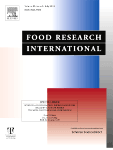
FOOD RESEARCH INTERNATIONAL
Advancing Knowledge in Food ScienceFOOD RESEARCH INTERNATIONAL is a premier academic journal published by ELSEVIER, specializing in the field of Food Science. With an impressive impact factor and ranked Q1 in the 2023 category quartiles, it stands at the forefront of research, positioned 17th out of 389 in the Scopus ranking for Agricultural and Biological Sciences, attaining a commendable 95th percentile. The journal publishes high-quality, peer-reviewed articles that cover a broad spectrum of topics, including food safety, quality control, nutrition, and biotechnology, making it an invaluable resource for academics, industry professionals, and students alike. As FOOD RESEARCH INTERNATIONAL seeks to enhance understanding and advance technologies related to food, it encourages innovative perspectives and interdisciplinary research. The journal, active from 1992 and continuing through 2024, is an essential platform for disseminating vital findings and fostering collaboration within the global food science community.
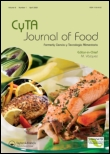
CyTA-Journal of Food
Empowering knowledge sharing in food science.CyTA-Journal of Food is a prestigious academic journal published by TAYLOR & FRANCIS LTD, dedicated to advancing the field of food science and technology through the dissemination of innovative research and practical knowledge. With an ISSN of 1947-6337 and an E-ISSN of 1947-6345, this journal stands out with its strong impact factor and is currently placed in the Q2 quartile across multiple categories, including Chemical Engineering, Chemistry, and Food Science, making it a vital resource for researchers and professionals alike. The journal has been an integral part of the academic community since its inception in 2009, and continues to publish cutting-edge articles through to 2024. Its alignment with Scopus ranks further signifies its influence, notably achieving 67th percentile in Industrial and Manufacturing Engineering. As an Open Access journal, it ensures widespread accessibility to its valuable content, promoting collaboration and knowledge sharing among scientists, engineers, and students dedicated to enhancing food safety, quality, and sustainability.

JOURNAL OF FOOD SCIENCE AND TECHNOLOGY-MYSORE
Connecting Academia and Industry in Food InnovationJOURNAL OF FOOD SCIENCE AND TECHNOLOGY-MYSORE, published by SPRINGER INDIA, is a distinguished peer-reviewed journal that has been contributing to the ever-evolving field of food science since its inception in 1974. With an ISSN of 0022-1155 and E-ISSN 0975-8402, this journal holds a commendable position in the Q2 category for Food Science, as per the 2023 metrics, and ranks #58 out of 389 in Scopus's Agricultural and Biological Sciences sector, achieving an impressive 85th percentile. The journal publishes high-quality research articles, reviews, and case studies that cover a wide array of topics, from food preservation to innovative technologies in food processing. Although it is not an open-access journal, it endeavors to disseminate essential knowledge and research strategies that advance food science and benefit both industry professionals and academia. The geographical reach of the journal, alongside its rigorous editorial standards, solidifies its stature as a pivotal resource for researchers, professionals, and students dedicated to the enhancement of food science practices and technologies.
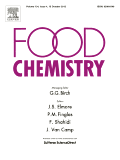
Food Chemistry
Unveiling the Chemistry of Flavor and NutritionFood Chemistry, published by Elsevier Science Ltd, is a leading international journal dedicated to the publication of high-quality research in the field of food chemistry. Established in 1976, this journal has made a significant impact in its realm, with an impressive 2023 impact factor and ranked Q1 in Analytical Chemistry, Food Science, and miscellaneous Medicine categories. It currently holds a remarkable Scopus ranking of #3 in Analytical Chemistry and #11 in Food Science, signifying its relevance and prestige among the top scholarly publications. With a wide scope that includes the chemistry of food composition, flavor, and safety, Food Chemistry serves as an essential resource for researchers, professionals, and students alike, offering insights and advancements in food analysis and technology. Access options may vary, and the journal is committed to disseminating innovative findings to foster knowledge and application in the dynamic field of food science.

International Food Research Journal
Elevating Food Science with Quality InsightsThe International Food Research Journal, published by UNIV PUTRA MALAYSIA PRESS, serves as a pivotal platform for disseminating innovative research within the field of food science. With an ISSN of 1985-4668 and an E-ISSN of 2231-7546, the journal has successfully established its presence since its inception in 2007, converging its findings through 2024. This esteemed journal holds a Q3 ranking in Food Science, illustrating its valuable contributions to the field as demonstrated by its Scopus rank of 276 out of 389, placing it in the 29th percentile among its peers in Agricultural and Biological Sciences. Although it operates under a traditional publishing model, its academic integrity and focus on high-quality research ensure that it remains a vital resource for researchers, professionals, and students eager to explore advances in food technology, nutrition, and safety. By encouraging interdisciplinary collaboration and critical dialogue, the International Food Research Journal plays an essential role in shaping the future of food science research.

Food Chemistry-X
Unlocking Innovations in Food Chemistry.Food Chemistry-X is a premier open-access journal published by Elsevier, dedicated to advancing the field of food chemistry through high-quality research and comprehensive reviews. With its ISSN of 2590-1575, the journal has gained significant attention since adopting an open-access model in 2019, allowing wide dissemination of knowledge and innovations in food science. Based in the United Kingdom, it holds prestigious Q1 rankings in both Analytical Chemistry and Food Science categories as of 2023, positioning itself as a leading platform for researchers worldwide. The journal's focus spans extensive topics within food chemistry, including food safety, nutritional analysis, and the chemical properties of food, offering insights that are crucial for addressing contemporary challenges in food production and consumption. With a Scopus rank placing it in the 65th percentile among the top journals in Food Science and the 58th percentile in Analytical Chemistry, Food Chemistry-X is an essential resource for academics, professionals, and students seeking to stay at the forefront of research and innovation in this vibrant field.

Food and Bioprocess Technology
Advancing the Future of Food and BioprocessingFood and Bioprocess Technology, an esteemed journal published by Springer, serves as a premier platform for disseminating cutting-edge research in the realms of food science, industrial manufacturing engineering, and process chemistry and technology. Established in 2008, the journal has quickly ascended to the prestigious Q1 quartile in multiple categories, highlighting its impact and relevance within the scientific community. With an impressive Scopus ranking that places it in the top tiers of its fields—such as rank #17 in Safety, Risk, Reliability, and Quality, and rank #38 in Food Science—this journal is pivotal for researchers and professionals aiming to publish innovative findings that advance food processing and bioprocess technology. Beyond its rigorous peer-review process, the journal facilitates access to high-quality, impactful research, reinforcing its significant role in shaping the future of biotechnological applications in food systems. Aimed at both scholars and practitioners, Food and Bioprocess Technology is an essential resource for those engaged in exploring sustainable practices and enhancing food quality and safety. Furthermore, by addressing essential topics in the field, it fosters collaboration and knowledge exchange among researchers dedicated to advancing the bioprocessing landscape.

Acta Scientiarum Polonorum-Technologia Alimentaria
Exploring the Future of Food TechnologyActa Scientiarum Polonorum-Technologia Alimentaria, published by Poznan University of Life Sciences, is a revered journal in the field of food science, showcasing cutting-edge research and innovations in food technology. Established as a leading platform within its domain, this journal is indexed under Scopus and ranks in the 2023 Q3 quartile for Food Science, demonstrating its commitment to high-quality scholarship. With an ISSN of 1644-0730 and E-ISSN 1898-9594, it serves as a critical resource for researchers, professionals, and students seeking to stay at the forefront of advancements in food safety, quality control, and sustainable practices. The journal has also been recognized for its contributions to the agricultural and biological sciences, positioning itself at rank #205 out of 389 in this competitive field. While currently not offering open access, the journal's valuable insights and findings, especially as it publishes through 2024, play a crucial role in advancing knowledge and fostering collaboration among experts in the food science sector.
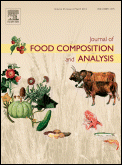
JOURNAL OF FOOD COMPOSITION AND ANALYSIS
Elevating Standards in Food Science ResearchJOURNAL OF FOOD COMPOSITION AND ANALYSIS, published by Academic Press Inc. Elsevier Science, is a leading peer-reviewed journal in the field of Food Science, recognized for its substantial impact on advancing research and knowledge within the discipline. With a commendable Q1 quartile ranking in the 2023 category of Food Science and a Scopus rank of 86/389, this journal holds a prestigious position, emphasizing its significance in crop and food quality research. The journal's scope encompasses a wide range of studies related to food composition, nutrition, and analytical methodologies, aiming to foster innovation and knowledge dissemination in food science. Although it operates under a subscription model, it remains an essential resource for researchers, professionals, and students seeking credible and cutting-edge findings. Established in 1987, the JOURNAL OF FOOD COMPOSITION AND ANALYSIS continues to be at the forefront of food science, contributing to the understanding of food quality and nutrition standards globally.

FOOD SCIENCE AND BIOTECHNOLOGY
Exploring the Intersection of Science and Culinary ArtsFOOD SCIENCE AND BIOTECHNOLOGY, published by the Korean Society of Food Science & Technology (KOSFOST), stands as a prominent peer-reviewed journal dedicated to advancing knowledge in the fields of food science, biotechnology, and applied microbiology. With ISSN 1226-7708 and E-ISSN 2092-6456, this journal serves as a pivotal platform for disseminating high-impact research from South Korea and beyond, reflecting a robust Q2 ranking in multiple categories including Applied Microbiology and Biotechnology, Biotechnology, and Food Science as of 2023. The journal's influence is further emphasized by its positions in various Scopus ranks, where it showcases a commendable percentile ranking in Agricultural and Biological Sciences and Biochemistry. Although access options remain limited, the journal’s objectives revolve around the publication of innovative research, fostering interdisciplinary collaboration, and facilitating the exchange of ideas among a diverse community of researchers, professionals, and students. Whether you are involved in food technology, microbial biotechnology, or nutritional sciences, FOOD SCIENCE AND BIOTECHNOLOGY are instrumental in shaping the future of these critical fields, propelling advancements that enrich our understanding of food systems and health.